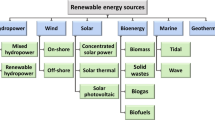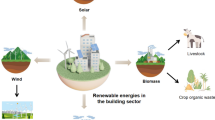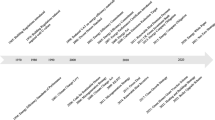Abstract
The main aim of this study is to compare how specific conditions in certain countries (in this case, the UK and Sweden) can stimulate or oblige householders to be more energy efficient, or can obstruct this. European goals for energy and emission reductions now constitute the main frame for long-term energy policy changes, but national governments develop and implement policy in contrasting ways and in different contexts. Important aspects are: geographical context, degree of liberalisation of electricity and gas industry, structure and composition of energy systems, metering and billing infrastructure, and the nature of electrical load problems. The following conditions are described and compared in this paper: (1) regulation to control residential consumption and emissions; (2) energy systems; (3) electricity pricing; (4) the role of utilities and other agents in residential demand reduction; (5) quality of feedback on energy use to the householder; and (6) customer behaviour and perceptions of energy use. The analysis is carried out with a view to ecological, economic and social aspects of energy systems. The comparison shows the significance of factors that are sometimes overlooked when considering the potential for demand reduction and load management, and produces some lessons and questions that are widely applicable.




Similar content being viewed by others
Notes
See http://oxrep.oxfordjournals.org/cgi/content/abstract/21/1/128 for details.
National Grid 7-year statement, 2006
e.g. SSE ‘Better Plan’ and EdF Energy ‘Read, Reduce, Reward’
Previously known as the Energy Efficiency Commitment.
References
Baker, W., & White, V. (2008). Towards sustainable energy tariffs. A report for the National Consumer Council. Bristol: Centre for Sustainable Energy.
Bartusch, C. (2007). Visualisering av elanvändning i flerbostadshus. (Visualising electricity use in blocks of flats). Elforsk, report 08:18.
BERR (2009) Energy Trends. Department of Business, Enterprise and Regulatory Reform, London http://www.berr.gov.uk/files/file50354.pdf.
Blomberg, M. (2008). Tankar om andan i samhället då nu och framåt. (Thoughts about the spirit of the society in the past, now and in the future). Stockholm: Styrelsen för psykologisk försvar.
Boardman B (2007) Home truths. A low-carbon strategy to reduce UK housing emissions by 80% by 2050. Research report for the Cooperative Bank and Friends of the Earth, London. http://www.eci.ox.ac.uk/research/energy/downloads/boardman07-hometruths.pdf.
Boardman, B. (2009). Fixing fuel poverty. London: Earthscan.
Boardman, B. & Palmer, J. (2003). 4CE: Consumer choice and carbon consciousness in electricity. Final report. http://www.electricitylabels.com/reports.html.
Boyd, J. (2008). Presentation to UKERC seminar, Managing residential electricity demand: Learning from experience in the UK and Ontario, May 21–23. http://www.ukerc.ac.uk/Downloads/PDF/Meeting%20Place/Events/2008/05UKcanadademandred/Boyd,%20Jenny.pdf.
Carlsson-Kanyama, A., & Lindén, A-L. (2002). Hushållens energianvändning. Värderingar, beteende, livsstilar och teknik. (Energy use in households. Values, behaviour, life styles and technology).
CEC (2008). Communication from the commission to the European Parliament, the Council, the European economic and social committee and the committee of the regions. 20 20 by 2020: Europe’s climate change opportunity. http://eur-lex.europa.eu/LexUriServ/LexUriServ.do?uri=COM:2008:0030:FIN:EN:PDF.
Christie, I., & Jarvis, L. (2001). How green are our values? In: British Social Values: 18th report. SAGE, London
CoI. (2006). Attitudes to climate change—wave 3. Research carried out for DEFRA. London: Central Office of Information.
Darby, S. (1999). Energy advice – what is it worth? Proceedings, European council for an energy-efficient economy, III.05.
Darby, S. (2008). Why, what, when, how, where and who? Developing UK policy on metering, billing and energy display devices. Proceedings of ACEEE summer study on energy efficiency in buildings, Asilomar, CA. August 17–22. Paper 7,137.
Darnton, A (2008) An overview of behaviour change models and their uses. GSR Behaviour change knowledge review, reference report. Centre for Sustainable Development, University of Westminster. http://www.civilservice.gov.uk/Assets/Behaviour_change_reference_report_tcm6-9697.pdf.
Daun, Å. (1989). Svensk mentalitet (Swedish mentality). Stockholm: Rabén & Sjögren.
DECC (2009a). Digest of United Kingdom energy statistics. Department of energy and climate change, London http://www.decc.gov.uk/en/content/cms/statistics/publications/dukes/dukes.aspx
DECC (2009b). The UK low carbon transition plan. Department of energy and climate change, London http://www.decc.gov.uk/en/content/cms/publications/lc_trans_plan/lc_trans_plan.aspx.
DECC (2009c). Towards a smarter future: Government response to the consultation on electricity and gas smart metering. Department of energy and climate change, London http://www.decc.gov.uk/en/content/cms/consultations/smart_metering/smart_metering.aspx.
Devine-Wright, H., & Devine-Wright, P. (2005). Representing the demand side: ‘deficit’ beliefs about domestic electricity users. Proceedings, ECEEE Summer Study.
Dobbyn, J., & Thomas, G. (2005). Seeing the light: the impact of micro-generation on our use of energy. Report for the sustainable development commission, London.
DTI. (2007). Meeting the energy challenge: a white paper on energy. London: UK Department of Trade and Industry.
Ersson, E., & Pyrko, J. (2009a). El-info via digitala kanaler. Fallstudie 1”Min elförbrukning” hos Skånska Energi. (Information via digital channels. Case study 1”My electricity use” at Skanska Energy). Lund University, Energy Sciences, LUTMDN/TMHP--09/3039--SE.
Ersson, E., & Pyrko, J. (2009b). El-info via digitala kanaler. Potential att förändra elanvändning i bostäder, Fallstudie 2: “Dina Sidor” hos Öresundskraft AB. (Information via digital channels. Case study 2”Your Pages” at Öresundskraft AB). Lund University, Energy Sciences, LUTMDN/TMHP-- 09/3042--SE.
EST (2008) A quick guide to CERT. Energy saving trust, London. www.energysavingtrust.org.uk/esr/content/download/80179/184319/file/CERT%20Quick%20Guide.pdf.
EST. (2007). The ampere strikes back. How consumer electronics are taking over the world. London: Energy Saving Trust.
Eyre, N., Pavan, M., & Bodineau, L. (2009). Energy company obligations to save energy in Italy, the UK and France: what have we learnt? Proceedings, European council for an energy efficient-economy summer study, Paper 2164.
Hallin et al. (2007). Att presentera förbrukning grafiskt – den samlade kunskapen. (To present the usage graphically – the integrated knowledge). Elforsk.
Hinchliffe, S. (1996). Helping the earth begins at home: the social construction of socio-environmental responsibilities. Global Environmental Change, 6(1), 53–62.
HoC (2008). Energy prices, fuel poverty and Ofgem. 11th report of Session 2007–8 of the house of commons business and enterprise committee, volume 1. London.
Lindskoug S (2006) Consumer reactions to peak prices. Elforsk, report 06:40.
Logica. (2006). Energy efficiency and the consumer—a European survey. London: Logica CMG.
New Perspectives/BMRB. (2002). Benefits of energy advice: report on a survey. London: Report for the Energy Advice Providers Group.
Nordel (2008). Nordel’s statistics
Owen, G., & Ward, J. (2007). Smart meters in Great Britain: The next steps? Sustainability first, London.
Owen, G., & Ward, J. (2010). Smart pre-payment in Great Britain. London: Sustainability First.
Parag, Y., & Darby, S. (2009). Consumer—supplier—government triangular relations: rethinking the UK policy path for carbon emissions reduction from the UK residential sector. Energy Policy, 37(10), 3984–3992.
Pyrko, J. (2005). Direkt och indirect laststyrning i samspel? – Fallstudier (Direct and indirect load control – case studies). Lund University, Energy sciences.
Pyrko, J. (2006). Load demand pricing - Case studies in residential buildings. EEDAL’06, London.
Pyrko, J (Ed). (2008). Visualising energy use (Visualisering av energianvändning). Dept of energy sciences, Lund University-LTH, Report LUTMDN/TMHP—08/3036--SE, 2008, in Swedish.
Pyrko, J. (2009). El-info via digitala kanaler. Potential att förändra elanvändning i bostäder, Fallstudie 3: “EnergiDialog-Privat” hos E.ON Sverige AB. (Information via digital channels. Case study 3”Energy Dialogue Private” at E.ON Sweden AB). Lund University, Energy Sciences, LUTMDN/TMHP-- 09/3044--SE.
Pyrko, J. et al. (2002). Preliminär debitering och mätperiodens längd (Preliminary billing and the length of the billing period). Energy sciences, Lund University.
Roberts, S., White, V., Preston, I., & Thumim, J. (2007). Assessing the social impacts of a supplier obligation. A study for DEFRA. Centre for sustainable energy, Bristol. http://www.cse.org.uk/pdf/pub1085.pdf.
SDC (2008). Supplier obligation project. Sustainable development commission, London. http://www.sd-commission.org.uk/pages/supplier-obligation-project.html.
SOU (2008). Vägen till ett energieffektivare Sverige (The way to a more energy efficient Sweden) Statens offentliga utredningar (State Official,Reports) SOU 2008:110.
Swedish Parliament (2006) Bill no. 2005/06:145. National programme for improving the efficiency of energy use in buildings and smart energy construction.
Swedish Parliament (2009). Bill no. 2008/09:162. A coherent climate and energy policy.
UK Government (2008). Climate Change Act. http://www.opsi.gov.uk/acts/acts2008/pdf/ukpga_20080027_en.pdf.
Swedish Energy Agency (2008) Energy in Sweden. Report ER 2008:15.
Utley, J.I., & Shorrock, L.D. (2008). Domestic energy fact file. building research establishment publications, London. http://www.bre.co.uk/filelibrary/rpts/eng_fact_file/Fact_File_2008.pdf.
Walker, G., & Cass, N. (2007). Carbon reduction, ‘the public’ and renewable energy: engaging with socio-technical configurations. Area, 39(4), 458–469.
Ward, I. C. (2008). What are the energy and power consumption patterns of different types of built environment? Energy Policy, 36, 4622–4629.
Wilhite, H. (2008). New thinking on the agentive relationship between end-use technologies and energy-using practices. Energy Efficiency 1(1).
Acknowledgements
Sarah Darby gratefully acknowledges the support of the Economic and Social Research Council (ESRC), through a Research Councils’ Energy Programme interdisciplinary research fellowship. Jurek Pyrko gratefully acknowledges the support of the Swedish Energy Utilities R&D Association Elforsk within ELAN programme.
Author information
Authors and Affiliations
Corresponding author
Rights and permissions
About this article
Cite this article
Pyrko, J., Darby, S. Conditions of energy efficient behaviour—a comparative study between Sweden and the UK. Energy Efficiency 4, 393–408 (2011). https://doi.org/10.1007/s12053-010-9099-x
Received:
Accepted:
Published:
Issue Date:
DOI: https://doi.org/10.1007/s12053-010-9099-x




